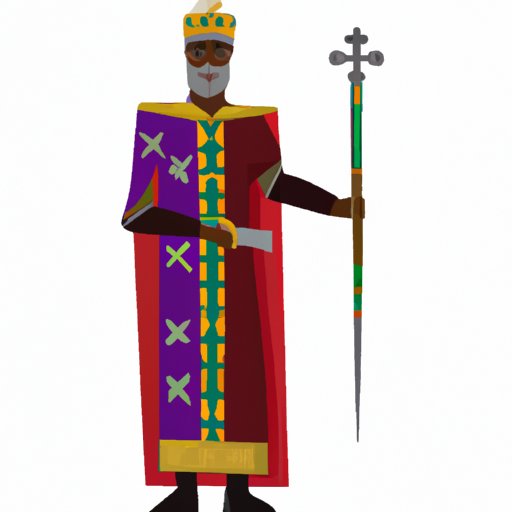Introduction
Charlemagne (742-814) was one of the most influential figures in European history. He is best known for uniting much of Europe under his rule and for reviving the culture and learning of the Roman Empire. His reign from 768 to 814 is often referred to as the Carolingian Renaissance, and he is remembered as a great ruler and leader. This article will explore how Charlemagne was a good leader by examining his vision and goals, system of governance, focus on education and the arts, administrative, judicial, and financial reforms, expansion of Christianity, military successes, diplomatic relationships, and legacy.
Analyzing Charlemagne’s Leadership Style
Charlemagne had a clear vision of what he wanted to achieve during his reign. He saw himself as a Christian ruler who was responsible for restoring the Roman Empire and bringing peace and order to the kingdom. He sought to create a strong and unified empire with a well-developed system of government and laws that would ensure justice and prosperity for all citizens. This vision was reflected in his system of governance, which included appointing counts and dukes to oversee local areas, creating a centralized government bureaucracy, and establishing a set of written laws.
Charlemagne also placed a strong emphasis on education and the arts. He established a school at Aachen where scholars could study Latin, Greek, and law. He encouraged the spread of literacy and established libraries throughout the kingdom. He also supported the development of music, poetry, and architecture, and his court was renowned for its cultural achievements. These efforts helped to revive the culture and learning of the Roman Empire and laid the foundations for the later European Renaissance.
Examining Charlemagne’s Reforms and Policies
To ensure the stability and prosperity of his kingdom, Charlemagne implemented a number of administrative, judicial, and financial reforms. He divided the kingdom into counties and appointed counts to govern them. He also established a centralized government bureaucracy, including a chancellor and missi dominici (royal envoys) to oversee local affairs. He created a set of written laws, known as the Capitulare legis salicae, that provided a uniform code of justice throughout the kingdom.
Charlemagne also reformed the monetary system and imposed a heavy tax burden on the people. He issued new coins, called denarii, which were based on the silver penny of the Roman Empire. He also introduced a system of tolls and tariffs to raise revenue for the kingdom. These reforms helped to strengthen the economy and allowed Charlemagne to finance his military campaigns and other endeavors.
Exploring Charlemagne’s Impact on the Expansion of Christianity
Charlemagne was a devout Christian and sought to spread the faith throughout his realm. To this end, he launched a series of missionary expeditions to convert pagan tribes in Germany and Scandinavia. He also played an important role in establishing the papacy as the supreme authority in the church. He crowned Pope Leo III in 800 and granted him temporal authority over Rome and the surrounding area. Charlemagne also supported the establishment of monasteries throughout his kingdom, which helped to preserve knowledge and spread the teachings of Christianity.
Investigating Charlemagne’s Military Successes
Charlemagne was a skilled military leader who achieved a number of impressive victories. He employed a variety of tactics, such as surprise attacks, feigned retreats, and encirclement maneuvers. He also used diplomacy to secure alliances with other rulers. Through these strategies, he was able to expand Frankish territory and gain control of much of modern-day France and Germany. He also established a buffer zone along the eastern border of the kingdom to protect it from outside forces.
Evaluating Charlemagne’s Diplomatic Relationships
In addition to his military successes, Charlemagne was also a talented diplomat. He was able to forge peaceful relationships with other rulers, such as the Lombards, whom he defeated in 774. He formed an alliance with the Pope, granting him temporal authority over Rome and the surrounding area. He also maintained friendly relations with Byzantium, which helped to ensure the security of the kingdom.
Assessing Charlemagne’s Legacy
Charlemagne’s reign was a period of great achievement and progress. He laid the foundations for the later European Renaissance and made significant contributions to European history. His reforms and policies helped to strengthen the kingdom and ensured justice and prosperity for all citizens. He also expanded the influence of Christianity and helped to establish the Papacy as the supreme authority in the church. His legacy continues to be felt today, and he is remembered as one of the greatest rulers in European history.
Comparing Charlemagne to Other Great Leaders
Charlemagne can be compared to other great leaders in history, such as Julius Caesar, Napoleon, and Elizabeth I. Like Charlemagne, Julius Caesar was a great conqueror who expanded the Roman Empire and laid the foundations for the later Roman Republic. Napoleon is remembered for his military genius and for reforming the French legal system. Elizabeth I was a skilled diplomat who secured England’s independence from Spain and restored peace and stability to the kingdom. All three of these leaders had a profound impact on their respective societies and left a lasting legacy.
Conclusion
Charlemagne was a great leader who had a profound impact on European history. His vision and goals, system of governance, focus on education and the arts, administrative, judicial, and financial reforms, expansion of Christianity, military successes, and diplomatic relationships all contributed to his success as a ruler. His legacy continues to be felt today, and he is remembered as one of the greatest rulers in European history.
(Note: Is this article not meeting your expectations? Do you have knowledge or insights to share? Unlock new opportunities and expand your reach by joining our authors team. Click Registration to join us and share your expertise with our readers.)
